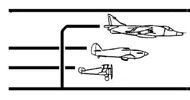| Name: | |
| Michael Frain | |
| Transcript: 6 | |
| How the unions contributed to the demise of BAe Kingston | |
Michael describes how, over, time modernization made the Kingston factory more profitable but that this was undermined by the trade unions. In the winter of 1989/1990 there was a prolonged and bitter strike over the issue of a reduced working week. In his opinion this strike was ‘the death blow to the Kingston site’ ands contributed to the announcement of the closure in 1990.You said that as well as management you also met a lot of resistance from unions – it was a very unionised work force. Yes it was. And they were very resistant to, they were steeped in the past, they were very resistant to new ways of doing things even though over a drink in the social club they might agree with you. And that must have been quite frustrating I guess. It was very frustrating. And In fact I think that attitude prevailed right through and possibly influenced the closure of the Kingston site. I know that a number of us thought the Kingston site was a profitable site and after years of investment and setting up new procedures and so on, had moved it forward considerably and was on a par with most manufacturing businesses. But I think that the workforce has something to answer to. And an illustration of this was the demand for a reduction in the working week. They wanted the working week for the workforce which was thirty nine hours; they wanted it reduced to something like thirty seven and a half. So one and a half hours a week. This was a strike across British Aerospace wasn’t it? It was but it was mainly Kingston and that was my dealing because I was on the negotiation team. And what sort of year was that? That would be around 1989. As a member of the negotiation team, I was asked for various ideas of what we could put in return for the reduction. And as I recall it, although it’s a long time ago now, we offered a step reduction that would be over two years. A one hour [in fact 45 minutes] reduction and then another half hour [45 minutes] or so, to bring it down in line with the office staff. And what we wanted in return was flexibility between the trades. But trying to get the flexibility was immensely difficult and sadly, they went on strike for twenty three weeks. I have never experienced, in all my working life, anything like that. Really ever experienced in any of the factories any strikes at all; because the people we were dealing with, the management we were dealing with, were generally appreciative and could come together and resolve the issue. I believe that the twenty three week strike over this one issue, that the management were prepared to reduce the working week but in return for flexibility and one or two other small items, was the death blow to the Kingston site. |
|


